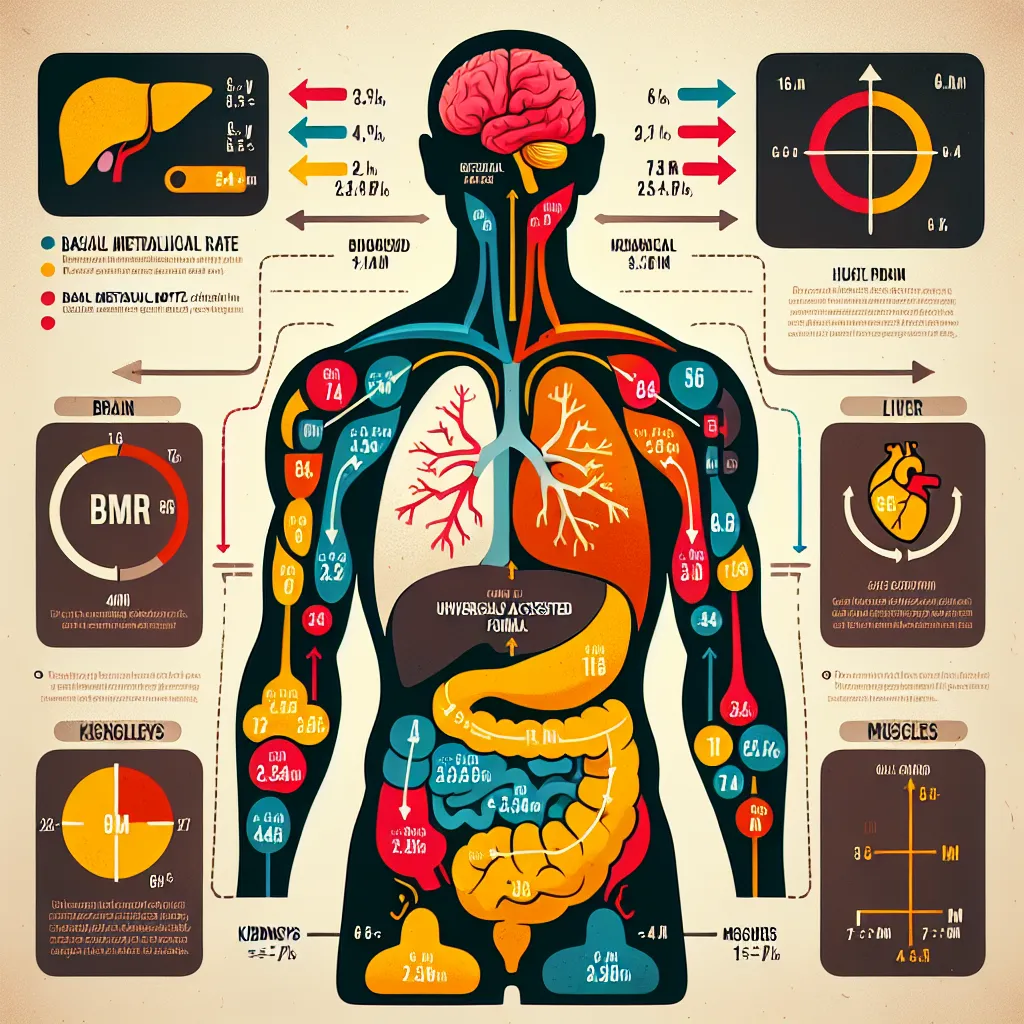Basal Metabolic Rate (BMR) is a crucial concept in the field of health and nutrition. Let’s explore this term in depth to enhance your IELTS vocabulary and comprehension skills.
Definition and Pronunciation
Basal Metabolic Rate (BMR)
- Definition: The number of calories your body burns while at rest to maintain vital functions.
- Part of Speech: Noun phrase
- Pronunciation: /ˈbeɪs(ə)l mɛtəˈbɒlɪk reɪt/

Context and Usage
Examples in Context
-
Your basal metabolic rate decreases as you age, which is why maintaining a healthy weight becomes more challenging over time.
- This sentence illustrates how BMR relates to aging and weight management.
-
“To accurately calculate your daily calorie needs, you must first determine your basal metabolic rate,” explained the nutritionist.
- Here, BMR is presented as a fundamental concept in calculating calorie requirements.
-
Athletes often have a higher basal metabolic rate due to their increased muscle mass.
- This example shows the relationship between BMR and body composition.
-
Understanding your basal metabolic rate is crucial for designing an effective weight loss program.
- This sentence emphasizes the importance of BMR in weight management strategies.
-
Factors such as genetics, body size, and hormonal status can influence an individual’s basal metabolic rate.
- This example highlights various factors affecting BMR.
Common Contexts
BMR is frequently discussed in:
- Nutrition and dietetics
- Fitness and exercise science
- Medical research, particularly in metabolism studies
- Weight management programs
Vocabulary Analysis
Word Structure
- Basal: relating to or situated at the base
- Metabolic: relating to metabolism
- Rate: a measure of a part with respect to a whole
Synonyms and Antonyms
Synonyms:
-
Resting metabolic rate (RMR)
- Definition: The rate at which the body burns energy while at complete rest
- Part of Speech: Noun phrase
- Pronunciation: /ˈrestɪŋ mɛtəˈbɒlɪk reɪt/
-
Idle energy expenditure
- Definition: The energy used by the body during inactivity
- Part of Speech: Noun phrase
- Pronunciation: /ˈaɪd(ə)l ˈenədʒi ɪkˈspendɪtʃə/
Antonyms:
-
Active metabolic rate
- Definition: The rate at which the body burns calories during physical activity
- Part of Speech: Noun phrase
- Pronunciation: /ˈæktɪv mɛtəˈbɒlɪk reɪt/
-
Total energy expenditure (TEE)
- Definition: The total amount of energy expended by an individual in a day
- Part of Speech: Noun phrase
- Pronunciation: /ˈtəʊt(ə)l ˈenədʒi ɪkˈspendɪtʃə/
Memorization Techniques
Mind Map
Create a mind map with “Basal Metabolic Rate” at the center, branching out to related concepts such as:
- Factors affecting BMR (age, gender, body composition)
- Calculation methods
- Applications in nutrition and fitness
- Related terms (RMR, TEE)
Mnemonic Device
Remember BMR as “Body’s Minimal Requirements” – this helps recall that it’s the basic energy needed for essential bodily functions.
Practice Exercises
-
Fill in the blank:
“The ____ ____ ____ (BMR) is higher in individuals with more muscle mass.” -
IELTS Writing Task 2 Practice:
Discuss the importance of understanding basal metabolic rate in developing effective public health strategies for combating obesity. -
IELTS Speaking Part 2 Task:
Describe a time when you learned about a health-related concept that changed your perspective on nutrition or fitness. You should mention:- What the concept was (e.g., basal metabolic rate)
- How you learned about it
- Why it was significant to you
- How it affected your approach to health and fitness
Conclusion
Understanding ‘Basal Metabolic Rate’ is crucial for anyone interested in health, nutrition, or fitness. It’s a term that frequently appears in IELTS reading passages and could be a valuable addition to your vocabulary for writing and speaking tasks. Remember to practice using this term in context to solidify your understanding and improve your ability to discuss health-related topics fluently.
We encourage you to share your experiences learning this term or any questions you might have about its usage in the comments section below. How might you incorporate ‘Basal Metabolic Rate’ into your IELTS preparation?